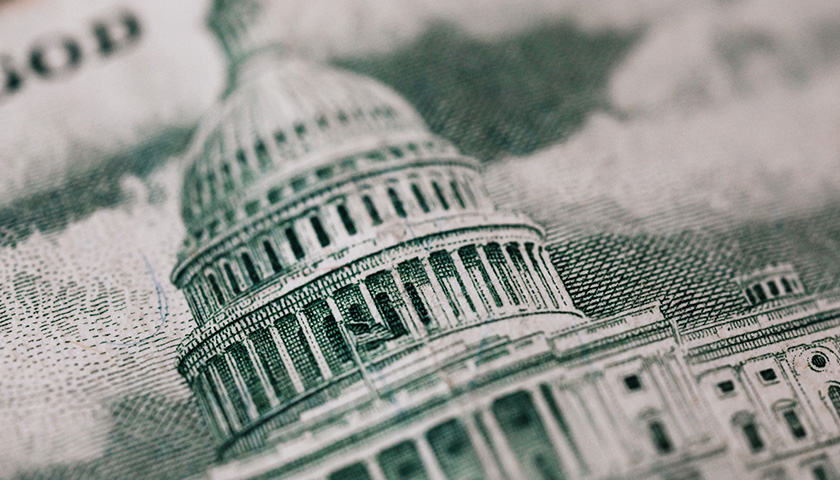by Nicholas Ballasy
The Committee for a Responsible Federal Budget (CRFB) a budget watchdog group, found that President Joe Biden’s fiscal year 2025 budget would drive the national debt to $45.1 trillion or 106 percent of the U.S. Gross Domestic Product (GDP) by 2034, from $27.4 trillion or about 97 percent of GDP at the present time.
The organization noted that those calculations are based on the Biden administration’s own internal figures. The current $27.4 trillion debt figure is the debt held by the public, not the total national debt including intragovernmental holdings.
‘Budget deficits would remain high under the President’s budget, rising from $1.7 trillion (6.3 percent of GDP) in FY 2023 to $1.9 trillion (6.6 percent of GDP) in 2024, falling to a low of $1.5 trillion (4.3 percent of GDP) in 2029, and then rising to $1.7 trillion (3.9 percent of GDP) by 2034,’ according to the CRFB’s analysis, released on Monday.
‘Deficits would total $16.3 trillion (4.6 percent of GDP) from FY 2025 through FY 2034, $3.2 trillion (0.9 percent of GDP) less than OMB’s baseline projection of $19.5 trillion (5.5 percent of GDP),’ the group reported.
The CRFB said that the “projected growth in debt and deficits under the president’s budget is driven by a persistent gap between spending and revenue” over time.
‘The White House needs to make debt reduction a major priority and work with Congress to take the issue seriously, stop making promises about what they won’t do, and work together to come up with serious workable solutions. This year, interest payments on the national debt will surpass spending on defense – a milestone that threatens our standing as the leader of the free world – and surpass spending on Medicare as well,’ said Maya MacGuineas, president of the CRFB.
‘Under current law, we will borrow more than $20 trillion over the next decade – and that’s assuming we don’t extend any of the expiring policies over the next few years. Meanwhile, Social Security and Medicare trust funds will be insolvent within a decade. We’ve reached the point at which baby steps just aren’t going to cut it anymore,’ she added.
Federal spending levels under the proposed Biden budget path ‘would rise from 22.7 percent of GDP in FY 2023 to 24.6 percent of GDP in 2024 and to 24.8 percent of GDP in 2025, and then fall slightly to 24.2 percent of GDP by 2034,’ the CRFB reported. ‘Revenue, which fell to 16.5 percent of GDP in 2023, would rise to 18.0 percent of GDP in 2024 and continue to grow to 20.3 percent of GDP by 2034.’
House Speaker Mike Johnson, R-La.; House Majority Leader Steve Scalise, R-La.; Majority Whip Tom Emmer, R-Minn.; and Republican Conference Chair Elise Stefanik, R-N.Y., publicly slammed Biden’s proposed budget on Monday.
‘The price tag of President Biden’s proposed budget is yet another glaring reminder of this Administration’s insatiable appetite for reckless spending and the Democrats’ disregard for fiscal responsibility. Biden’s budget doesn’t just miss the mark — it is a roadmap to accelerate America’s decline,’ the House GOP leaders said in a statement.
‘While hardworking Americans struggle with crushing inflation and mounting national debt, the President would increase their pain to spend trillions of additional taxpayer dollars to advance his left-wing agenda,’ they added.
The lawmakers decried the budget as ‘misguided’ for raising federal spending while the deficit and debt remain at record levels.
‘Our efforts to rein in the runaway spending spree from last year’s budget have already yielded results, lowering projected deficits by $2.6 trillion over the next decade,’ the GOP lawmakers said. ‘The House’s budget plan for the next fiscal year, preceding the president’s proposal, reflects the values of hardworking Americans who know that in tough economic times, fiscal discipline is non-negotiable. House Republicans understand the American people expect and deserve nothing less from their government.’
House Budget Committee Republicans highlighted 10 areas they describe as the worst parts of the budget, including permanently expanding “inflationary Obamacare subsidies” at a cost of $350 billion.
The committee released its own budget proposal on Thursday that it estimated would balance the federal budget in 10 years.
‘House Republicans have been long sounding the alarm on the fiscal challenges facing our nation and this budget plan takes steps to put the nation on the track to fiscal sanity,’ Johnson said of the GOP budget plan.
The progressive organization Public Citizen applauded Biden’s budget request for raising federal spending levels, despite the record deficit and debt.
‘The White House budget’s across-the-board increases would be a welcome relief to agencies and programs across the government that have seen their funding cut. In particular, it’s more critical than ever to generously fund initiatives to grapple with climate change,’ said Lisa Gilbert, executive vice president of Public Citizen.
‘This budget demonstrates a commitment to ensuring corporations pay more of their fair share. It proposes to increase both the domestic and international corporate rates as well as to raise the corporate minimum tax rate for billion-dollar companies put in place by the Inflation Reduction Act (IRA),’ she added.
– – –
Nicholas Ballasy is a reporter at Just The News.
Photo “The U.S. Capitol on American Currency” by Karolina Grabowska.




